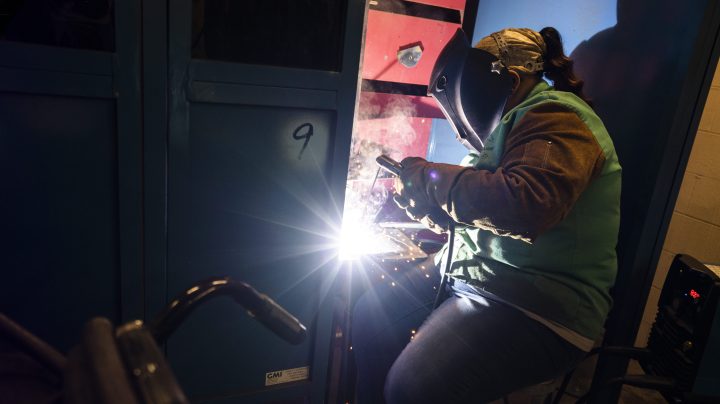
Principal of Detroit technical career center tackles pandemic’s challenges to training
Principal of Detroit technical career center tackles pandemic’s challenges to training

As coronavirus cases surge across the country, many states are reinstating safety restrictions. In Michigan, Gov. Gretchen Whitmer announced an emergency order on Nov. 15 that enacted “a three-week pause, targeting indoor social gatherings and other group activities in an effort to curb rapidly rising COVID-19 infection rates.” The state also paused in-person learning at high schools.
A few days prior, the Detroit Public Schools Community District announced it was halting in-person learning from Monday, Nov. 16 to Jan. 11. The measure affected Randolph Career and Technical Center, which in nonpandemic times provides hands-on learning in the construction trades. Before the suspension of face-to-face learning, some Randolph students came to the building in person. There, they could engage in the school’s virtual curriculum, have access to the building’s Wi-Fi and learn in a school setting. Marketplace host Kai Ryssdal spoke to Krista McKinney-King, Randolph’s principal, about pandemic learning with such an inherently hands-on curriculum.
Below is an edited transcript of their conversation.
Kai Ryssdal: Now, we should tell people we had this interview scheduled originally for a couple of days ago and had to reschedule because some of the stay-at-home orders and what-you-could-do-in-school orders changed in Michigan, which makes this first question all the more relevant. You’re kind of not in charge of what happens in your school, are you?
Krista McKinney-King: No, I have to be very flexible. We kind of just roll with it. You know, fortunately we rescheduled, but it was the result of the district suspending face-to-face learning.
Ryssdal: Well, look, what does that do to you as you’re running a career and technical education center, where almost by definition, it’s more hands-on than other kinds of education?
McKinney-King: So what has happened, really, since the beginning of the school year, students and their families had a choice as to whether or not they wanted to participate in face-to-face or virtual learning, and an overwhelming number of our high school students selected virtual. What has happened is that my welding instructor or even my carpentry instructor will provide a YouTube video based upon a specific task. He may engage in a demonstration himself that the students can view. The students will ask questions, but you’re absolutely right. They can’t get their hands on it. They can’t get their hands dirty and trust and believe they’re anxiously awaiting to do that.
Ryssdal: Have you seen since the pandemic started, right, so we had, we had last spring and everybody went online in a hurry. And it was of varying qualities, I’m sure. Then the summer was mostly off. And then in the fall semester, did you see increased demand for your courses and your, and your specialties?
McKinney-King: You know, I would love to say yes, only because when you think about the whole college and career pathways, you know, you have a lot of kids who are in college, but they’re learning online, they’re not on that college campus. And so you have parents who are kind of like, oh, my gosh, I’m paying all this money for my kid to still be at home learning, right? And not getting that full college experience. And then you would think that perhaps on the whole, for me, the skilled-trades industry would be more prominent. And so what we have done, we’ve done our best to capitalize on that and to really, you know, reiterate the importance of gaining a skill that can even take them further into a college pathway, if that makes sense. A lot of times you gain a skill to finance your college education. So I can say we continue to have those conversations. I cannot say I’ve seen a true increase.
Ryssdal: Well, yeah, so let’s play that out. Just as a last item here. Let’s pretend we’re on the other side of this thing. And let’s, just for argument’s sake, be a little pessimistic and say it’s next fall or even maybe early next winter. What does Randolph Career Center look like? And what is your field look like in terms of the services you’re providing? Post-, you know, post-pandemic.
McKinney-King: I’ve already started to think about my theme for next year, and it’s probably going to be Randolph Reset. And so what I want to do post-pandemic is make sure that I lift up this whole notion of digital literacy, continue to lift up the professional development that is needed for my teachers. Again, I’m already thinking forward, I’m positive. I think it was just an opportunity to allow students to consider even more postsecondary options.
Ryssdal: Right. Krista McKinney-King, she is the principal at Randolph Career and Technical Center. They are in Detroit. Ms. McKinney-King, thanks for your time. I really appreciate it.
McKinney-King: Thank you.
There’s a lot happening in the world. Through it all, Marketplace is here for you.
You rely on Marketplace to break down the world’s events and tell you how it affects you in a fact-based, approachable way. We rely on your financial support to keep making that possible.
Your donation today powers the independent journalism that you rely on. For just $5/month, you can help sustain Marketplace so we can keep reporting on the things that matter to you.

















